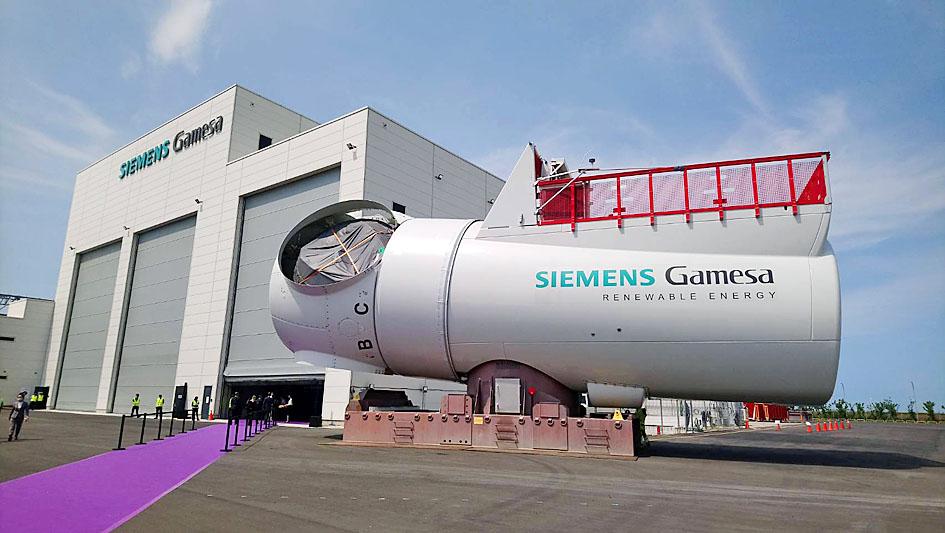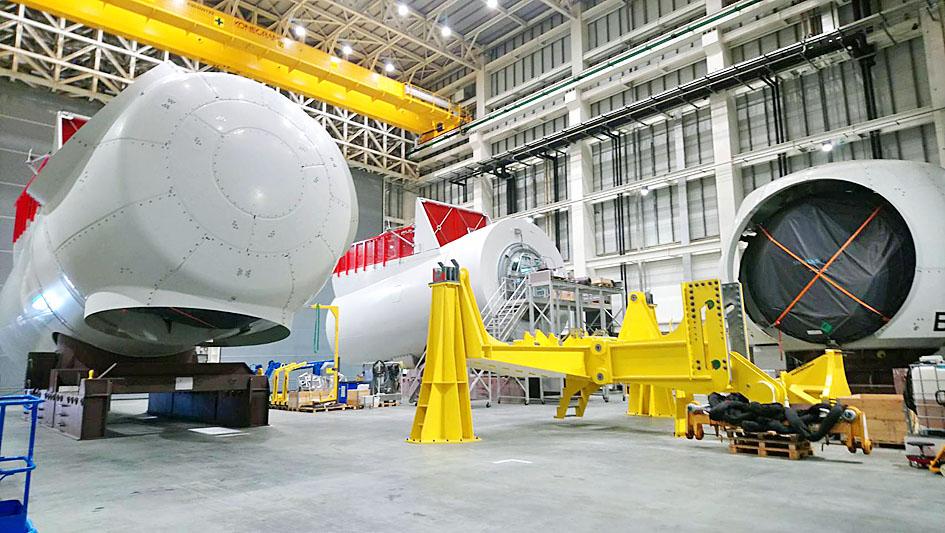Wind turbine manufacturer Siemens Gamesa Renewable Energy SA yesterday inaugurated Taiwan’s first nacelle assembly plant at the Port of Taichung, its first assembly facility for offshore nacelles outside Europe.
Vice Premier Shen Jong-chin (沈榮津), a long-time champion of Taiwan’s ambitions to become a regional hub in the offshore wind farm industry, described the plant as a “milestone” at a ceremony at the plant.
“The completion of Siemens Gamesa’s nacelle assembly plant is a milestone for the development of the offshore wind farm industry in Taiwan and a step toward localizing the supply chain,” Shen said.

Photo: Chang Hsuan-che, Taipei Times
“This is only the beginning. My great hope is for the company to continue to increase the level of local content for its nacelle assemblies,” he said.
The plant early last month completed the first made in Taiwan offshore wind turbine nacelle assembly.
Siemens Gamesa said its output would initially satisfy orders from Orsted A/S’ 900 megawatt Greater Changhua 1 & 2a Offshore Wind Farms projects.

Photo: Chang Hsuan–che, Taipei Times
Taiwan’s stage 3 offshore wind farm development plan calls for all nacelle assemblies to be made locally from next year.
However, Orsted Taiwan general manager Christy Wang (汪欣潔) said that the company is going “above and beyond local content requirements.”
“We look forward to on-time and on-quality delivery of wind turbines and nacelles next year,” Wang said.
Orsted A/S awarded the contract for the Changhua projects to Siemens Gamesa and asked it to accelerate the local assembly facility.
As a result, the locally made nacelles are expected to arrive significantly earlier than the government planned.
“We are very proud to once again deliver on our promises in Taiwan, together with our client Orsted, our contractors, and central and local authorities who have contributed and guided us throughout the process,” Siemens Gamesa Offshore for Asia-Pacific general manager Niels Steenberg said.
“With the right policy framework” the Taichung plant will eventually take on projects throughout the Asia-Pacific region, Steenberg said.
The plant has created approximately 80 direct nacelle technician jobs, the company said.
More than 160 tower sections have already been delivered and are stored at the port, it said, adding that the company is “on track” to deliver turbines to Orsted Taiwan for installation in the first quarter of next year.

SELL-OFF: Investors expect tariff-driven volatility as the local boarse reopens today, while analysts say government support and solid fundamentals would steady sentiment Local investors are bracing for a sharp market downturn today as the nation’s financial markets resume trading following a two-day closure for national holidays before the weekend, with sentiment rattled by US President Donald Trump’s sweeping tariff announcement. Trump’s unveiling of new “reciprocal tariffs” on Wednesday triggered a sell-off in global markets, with the FTSE Taiwan Index Futures — a benchmark for Taiwanese equities traded in Singapore — tumbling 9.2 percent over the past two sessions. Meanwhile, the American depositary receipts (ADRs) of Taiwan Semiconductor Manufacturing Co (TSMC, 台積電), the most heavily weighted stock on the TAIEX, plunged 13.8 percent in

A wave of stop-loss selling and panic selling hit Taiwan's stock market at its opening today, with the weighted index plunging 2,086 points — a drop of more than 9.7 percent — marking the largest intraday point and percentage loss on record. The index bottomed out at 19,212.02, while futures were locked limit-down, with more than 1,000 stocks hitting their daily drop limit. Three heavyweight stocks — Taiwan Semiconductor Manufacturing Co (TSMC, 台積電), Hon Hai Precision Industry Co (Foxconn, 鴻海精密) and MediaTek (聯發科) — hit their limit-down prices as soon as the market opened, falling to NT$848 (US$25.54), NT$138.5 and NT$1,295 respectively. TSMC's

TARIFFS: The global ‘panic atmosphere remains strong,’ and foreign investors have continued to sell their holdings since the start of the year, the Ministry of Finance said The government yesterday authorized the activation of its NT$500 billion (US$15.15 billion) National Stabilization Fund (NSF) to prop up the local stock market after two days of sharp falls in reaction to US President Donald Trump’s new import tariffs. The Ministry of Finance said in a statement after the market close that the steering committee of the fund had been given the go-ahead to intervene in the market to bolster Taiwanese shares in a time of crisis. The fund has been authorized to use its assets “to carry out market stabilization tasks as appropriate to maintain the stability of Taiwan’s

STEEP DECLINE: Yesterday’s drop was the third-steepest in its history, the steepest being Monday’s drop in the wake of the tariff announcement on Wednesday last week Taiwanese stocks continued their heavy sell-off yesterday, as concerns over US tariffs and unwinding of leveraged bets weighed on the market. The benchmark TAIEX plunged 1,068.19 points, or 5.79 percent, to 17,391.76, notching the biggest drop among Asian peers as it hit a 15-month low. The decline came even after the government on late Tuesday authorized the NT$500 billion (US$15.2 billion) National Stabilization Fund (國安基金) to step in to buoy the market amid investors’ worries over tariffs imposed by US President Donald Trump. Yesterday’s decline was the third-steepest in its history, trailing only the declines of 2,065.87 points on Monday and